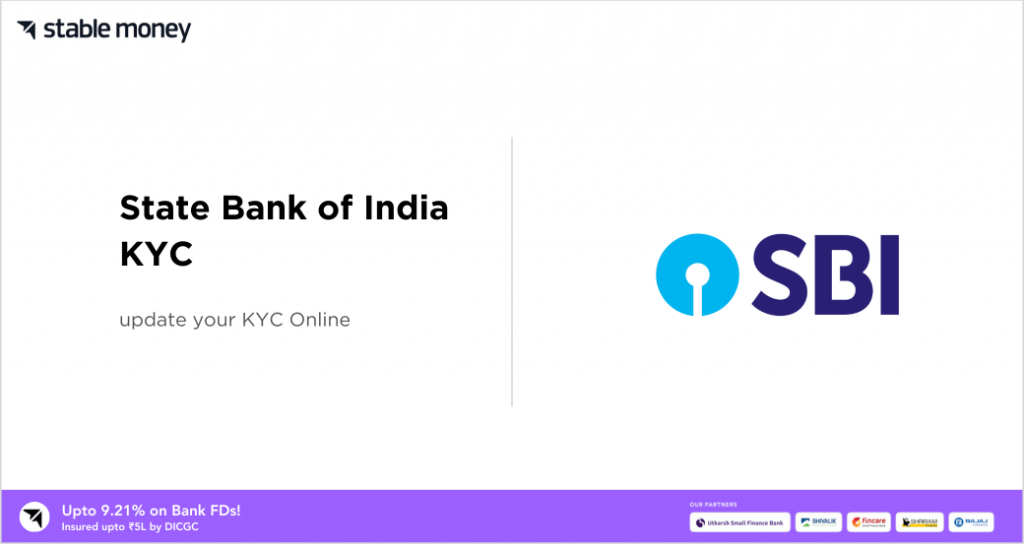
One of the most important ways to ensure your financial security is by updating your bank information. State Bank of India (SBI), being one of the biggest banks in India, has made it possible for its customers to update their SBI KYC details online without visiting a branch.
In this blog, we will provide you with a step-by-step guide on updating your SBI KYC online along with other related information.
How to Update SBI KYC Online?
Here are the easy steps you need to follow to make sure you can update SBI KYC online:
- Step 1: Visit the official website of the State Bank of India.
- Step 2: Enter your MPIN User ID and password to log in to internet banking portal.
- Step 3: Go to ‘My Accounts and Profile’.
- Step 4: Click on the ‘Update KYC’ icon and choose the account type from the drop-down menu.
- Step 5: Enter your address correctly.
- Step 6: Verify your Aadhaar number, PAN number, income parameters, and other details (if required).
- Step 7: Tick the declaration and click on ‘Submit’ to update.
How to Update SBI KYC Offline?
To update SBI KYC offline, follow these simple steps:
- Step 1: Visit the nearest SBI branch.
- Step 2: Request the KYC update form.
- Step 3: Fill the form accurately.
- Step 4: Attach self-attested document copies.
- Step 5: Submit the form and documents like Aadhaar card, PAN card, and recent photographs to bank officials.
- Step 6: Wait for the bank’s 24-hour verification process.
Documents Required for SBI KYC
The specific documents required for KYC verification depend on your circumstances. These include the following:
1. Proof of Identity for Individuals:
- PAN Card
- Driving Licence
- Aadhaar Card
- Voter ID Card
- Letter issued by the National Population Register containing details of name and address
- Job card issued by National Rural Employment Guarantee Act (NREGA) signed by a state government official
2. Proof of Address for Individuals:
- Passport
- Credit Card Statement (not more than 3 months old)
- Salary Slip
- Income/Wealth Tax Assessment Order
- Landline Telephone Bill (not more than 3 months old)
- Electricity Bill (not more than 6 months old)
- Bank Account Statement
- Letter from a Reputed Employer
- Letter from RecogniSed Public Authority
- Ration Card
3. Documents Required for NRIs:
Passport and Residence Visa Copies, duly attested by:
- Indian Embassy
- Notary Public
- Foreign Offices
- Officers of correspondent banks whose signatures can be verified through an authorised branch (A/B category Forex handling branch) of the bank.
4. Documents Required for Minors – SBI KYC
Documents required for SBI KYC update for minors include:
- If the minor is under 10 years of age, the ID proof of who is operating the account should be submitted.
- If a minor operates the account independently, standard KYC verification and procedures apply.
SBI KYC Rules & Regulations
Here are some basic rules to follow while updating the SBI KYC:
- All details and documents that you provide should be authentic.
- The frequency of periodic updation varies depending on the risk category.
- Your bank may request other documents based on customer profile and transaction monitoring.
Why Is It Important to Update SBI KYC?
Here are the reasons why you must do a SBI KYC update:
- If your bank documents are not up-to-date, SBI may freeze your account and you will not be able to make any transactions from your account.
- With accurate Know Your Customer (KYC) information, it is possible to identify and prevent fraudulent activity on your account.
- Updated KYC ensures smooth financial transactions like seamless loan approvals, fund transfers, and other financial activities.
- KYC updation can save you from potential penalties and account restrictions.
Final Word
It is important to update your SBI KYC information regularly for smooth financial transactions and to protect you from potential restrictions. Therefore, you must ensure timely updates with the necessary documents such as PAN, photos, OVDs, etc.
While confidentiality is of utmost importance, banks may share information based on specific legal requirements or with your permission. Ultimately, it is your responsibility to navigate through the KYC labyrinth and ensure a safe, transparent banking experience. Stay informed and proactive, and enjoy the benefits of being a SBI customer with peace of mind.
FAQs
Yes, KYC compliance is mandatory, driven by regulatory and legal imperatives. Under RBI’s KYC guidelines, Regulated Entities must implement a robust policy framework for KYC. The Prevention of Money Laundering Act, in effect since July 1, 2005, mandates all financial institutions to meet defined KYC and AML standards.
KYC is required for various cases, including opening a new account, subsequent account openings without current KYC documentation, when additional information is deemed necessary and when periodic intervals instructed by RBI are due. It is also important in case of changes to signatories or beneficial owners.
Yes, SBI maintains strict confidentiality of your KYC information. However, they may share it under specific legal requirements, public duty, their interest, or with your consent.
Your periodic updates will vary based on three categories: High-risk (every 2 years), Medium-risk (every 8 years) and low-risk (every 10 years). You can check your risk category through online banking or by contacting your branch.
Disclaimer
This article is solely for educational purposes. Stable Money doesn't take any responsibility for the information or claims made in the blog.

